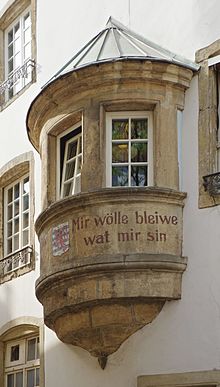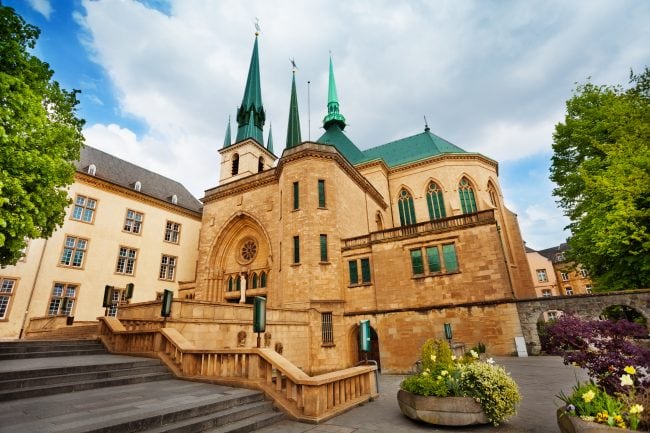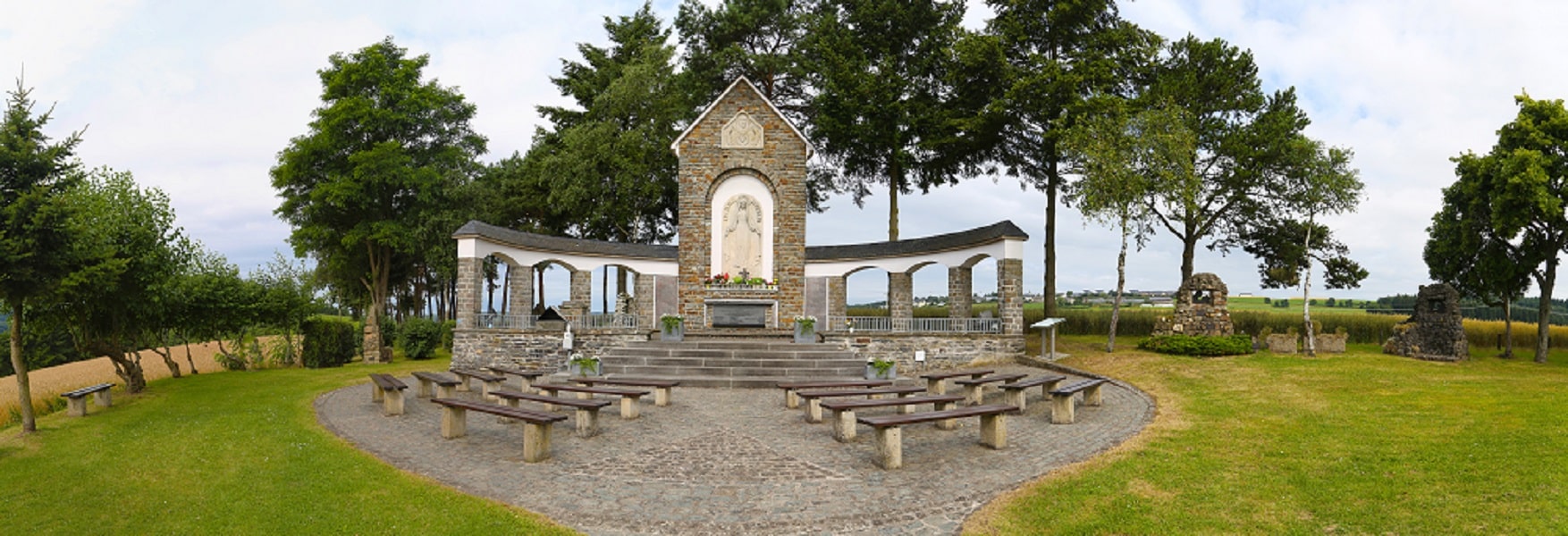Despite its modest size, Luxembourg has for centuries been the focus of wars of succession and European conflicts. From its humble origins, Luxembourg has evolved through a rich and fascinating history into a prosperous and stable country. Today, it plays a central role in Europe.
"Mir wölle bleiwe wat mir sin" - "We want to remain what we are".
Luxembourg currency
Luxembourg's motto reflects its desire for independence from the countries that annexed it. It shows its determination to preserve its national identity.
From origins to annexations and Luxembourg's independence
The founding of Luxembourg: from fortress to dynasty
Luxembourg's origins date back to the early Middle Ages. A small fortification, Lucilinburhuc, was built on top of a rocky promontory, the Bock rock. Acquired by Count Sigefroi in 963, the small fort gave rise to the County of Luxembourg.
Several count's houses succeeded one another, working to develop the County of Luxembourg. Over the years, the County acquired increasing importance and political power.
Under the House of Luxembourg, the county extended its territorial influence and gained in importance. In 1308, Count Henri VII became king. In 1312, he was crowned Holy Roman Emperor. His son Jean-dit-l'Aveugle, the founder of the Schueberfouer, became King of Bohemia.
In 1354, his descendant Charles IV raised the County of Luxembourg to the rank of Duchy. Thanks to numerous territorial regroupings, Luxembourg now occupied a vast territory stretching between the Meuse and Moselle rivers. In 1364, Luxembourg reached an area of over 10,000 square kilometers. Luxembourg territory was at its peak.
The Luxembourg territory, part of a turbulent history in Europe

Luxembourg's strategic location between France, Germany and Belgium made it a coveted territory for rival powers. The territory changed hands several times. From the Burgundians to the Habsburgs, the Spanish and the French, Luxembourg's fate was often decided by political alliances and military conflicts.
Burgundian annexation of Luxembourg and Dutch principality
Lacking a male heir, the Duchy of Luxembourg passed into Burgundian hands in 1443. It was annexed by the Duke of Burgundy, Philippe le Bon. French became the main administrative language. Luxembourg then belonged to the Netherlands , as a relatively autonomous principality. Its destiny was linked to this kingdom.
The City of Luxembourg, Gibraltar of the North
Later, as a result of royal marriages, Luxembourg passed into the hands of the Habsburgs of Spain in 1555 . Due to its strategic location, Luxembourg became embroiled in numerous wars between France and Spain. It was at this point that the city of Luxembourg was transformed into a renowned fortress. It became the "Gibraltar of the North".
Cession of Luxembourg to France and Vauban fortifications
The Treaty of the Pyrenees in 1659 cedes southern Luxembourg to France. The town of Thionville became French. Later, Louis XIV's troops laid siege to the city of Luxembourg. This also passed to France in 1684. It was then that the famous Vauban fortifications were built.
Luxembourg returned to Spain and annexed by Austria
In 1697, Luxembourg reverted to Spain. The Habsburgs reclaimed the duchy under the Treaty of Ryswick, putting an end to French expansionist desires. The War of the Spanish Succession handed Luxembourg to Austria in 1715.
Pacification of Luxembourg in the 18th century
The Austrian period was finally a peaceful one for Luxembourg. Numerous social and economic advances, such as freedom of worship and tax equality, laid the foundations for today's Luxembourg.
Luxembourg, France's forestry department
However, following a blockade by Revolutionary troops in 1795, the fortress reverted back to France. Under Napoleon's reign, Luxembourg became the Département des Forêts.
The "Klëppelkrich" war against generalized military service took place in 1798. The Napoleonic Code is introduced in 1804. It is the basis of Luxembourg's civil code.
The fall of Napoleon's empire led to a new division of Europe.
From the Congress of Vienna to Luxembourg's independence
Luxembourg, a neutral territory
After the tumultuous years of the French Revolution and the Napoleonic Wars, Luxembourg found itself at the center of the 1815 Congress of Vienna negotiations. In the 19th century, Europe's great powers sought stability. Luxembourg became a neutral, independent territory under the House of Orange-Nassau. William 1 of Orange-Nassau, King of the Netherlands, reclaimed the new state on a personal basis.
Part of Luxembourg's territory is awarded to Prussia. Prussia places a Prussian garrison in the city of Luxembourg.
With the Treaty of London in 1839, Luxembourg acquired its independence and its current form. Part of Luxembourg is given to Belgium (the province of Belgian Luxembourg) following the Belgian Revolution.
Luxembourg adopted a constitution in 1848.
With the new Treaty of London in 1867, Luxembourg acquired the status of a perpetually neutral and independent state. The fortress was dismantled. Prussian garrisons left the territory.
Luxembourg is a parliamentary monarchy, headed by the Grand Duke.
History of modern Luxembourg
Luxembourg's industrialization and prosperity in the 20th century
Luxembourg's neutral status, combined with the rapid development of its steel industry, contributed to its economic growth and prosperity.
At the end of the 19th and beginning of the 20th centuries, Luxembourg also experienced an industrial revolution with the development of the steel industry. Landscapes were transformed, in the south of the country in the Minett region, but also in the capital.
Italian and Portuguese workers begin to flock to the country. The beginning of a multicultural society. The country becomes urbanized. This period lays the foundations for modern Luxembourg.
The world wars and the German occupation of Luxembourg
Both world wars took a heavy toll on Luxembourg. Once again, its strategic position made it a target for invading forces. The Nazi occupation of the Second World War caused considerable human suffering and loss. However, the people of Luxembourg showed resilience and rediscovered their determination once the war was over.
European integration, Luxembourg's path to prosperity
Since the post-war years, Luxembourg has been committed to economic diversification and European integration. After Benelux in 1944, Luxembourg became a founding member of the European Union alongside France, Germany, Italy, Belgium and the Netherlands. It plays a leading role in shaping Europe, and is home to several key European institutions.
Today, the country is a shining example of integration. Its capital, Luxembourg, is a global financial center.
Luxembourg's history bears witness to the resilience and enterprising spirit of its people. The country is highly adaptable. Its pragmatism helps it to thrive in a changing world.
The legend of Mélusine in Luxembourg
Mélusine was the wife of Count Sigefroi, founder of the City of Luxembourg.
Legend has it that it was during a bear hunt among the ruins of an old castle that Count Sigefroi was seduced by the voice of a beautiful young girl. Falling in love, he proposed to Mélusine. She accepted, on condition that she never leave the castle. She also made him promise that he would never spy on her when she wanted to be alone.
Count Sigefroi and his wife settled in this old castle. They lived happily ever after. But one day, curious to see what his wife was doing when she was alone, Count Sigefroi spied her through the keyhole. He saw her lying in the bath, combing her long hair. But instead of legs, she had a big fishtail.
Betrayed, Mélusine disappeared forever into the waves of the Alzette.
Legend has it that Mélusine reappears every 7 years in the form of a snake. She waits for someone to free her from her spell. To do so, you need to take a key from her mouth and throw it into the Alzette.
While waiting for her deliverance, she sews a shirt, adding a stitch every 7 years. When the shirt is finished, Mélusine will be released from her spell. But in return, all the inhabitants of Luxembourg will disappear with her.
The statue of Mélusine can be seen on the banks of the Alzette, at the very spot where she is said to have disappeared into the river.
The Nassau-Weilburg dynasty on the Luxembourg throne
The beginnings of the Grand Duchy of Luxembourg
Luxembourg is the only Grand Duchy in the world. Following the collapse of the Napoleonic regime, Luxembourg was attached to the Netherlands as an independent state at the Congress of Vienna in 1815. It then acquired the title of Grand Duchy, headed by William 1st of Orange Nassau.
His descendants William II and William III continued this line and ruled the Grand Duchy of Luxembourg.
In 1890, Luxembourg obtained its own dynasty on the death of William III, with the accession to the throne of Grand Duke Adolphe de Nassau-Weilburg.
He was succeeded by his son William IV. His granddaughter, Grand Duchess Marie-Adélaïde, came to power in 1912. She was 17 at the time. Her attitude during the German invasion of World War 1 was harshly criticized. She abdicated at the end of the war in 1919.
Grand Duchess Charlotte, emblematic figure of Luxembourg
Grand Duchess Charlotte ascended the throne. During her reign, the country was once again invaded by German troops during the Second World War. Unwilling to submit, the Grand Duchess and her government went into exile in London. Luxembourg was liberated by American troops in June 1944. Grand Duchess Charlotte abdicated in 1964. She is much loved by Luxembourgers.
Grand Duke Jean succeeded his mother in 1964. Grand Duke Jean abdicated in October 2000. He dies in April 2019.
Grand Duke Henri, current Grand Duke of Luxembourg
His Royal Highness Grand Duke Henri succeeds his father. He continues to occupy the throne with his wife, Her Royal Highness Grand Duchess Maria-Teresa, a native of Cuba. They have five children.
The Crown Grand Duke is Prince Guillaume, their eldest son. He is accompanied by his wife, the Hereditary Grand Duchess, Princess Stéphanie, of Belgian origin. They have two children.
Find out more about Luxembourg's political system.
Luxembourg and its place in the European Union
Luxembourg, a founding member of the European Union
Luxembourg is one of the 6 founding members of the European Union. Some of its citizens are illustrious figures.
Robert Schuman is one of Europe's "founding fathers". Born in Luxembourg in 1886, and of Luxembourg origin on his mother's side, he was instrumental in the creation of the ECSC (European Coal and Steel Community) in 1951.
In 1952, the city of Luxembourg became the first place of work for the Community's institutions.
In 1957, Jean Monnet's creation of the European Economic Community marked a further step towards a supranational European organization.
Founded by Germany, France, Luxembourg, Belgium, the Netherlands and Italy, the EEC gradually expanded to include other countries. Today, the European Union comprises 27 countries.
Luxembourg, capital of Europe and European institutions
Luxembourg, the capital of Luxembourg, became a European capital in 1986. It shares this title with Brussels (Belgium) and Strasbourg (France), following the merger of the European institutions.
Today, Luxembourg City is home to the headquarters of several European institutions and bodies. Many European civil servants work here. These include :
- the Court of Justice,
- the Court of Auditors,
- the European Investment Bank,
- European Investment Fund
- several European Commission departments.
In fact, there is talk of a European quarter in the Kirchberg area.










